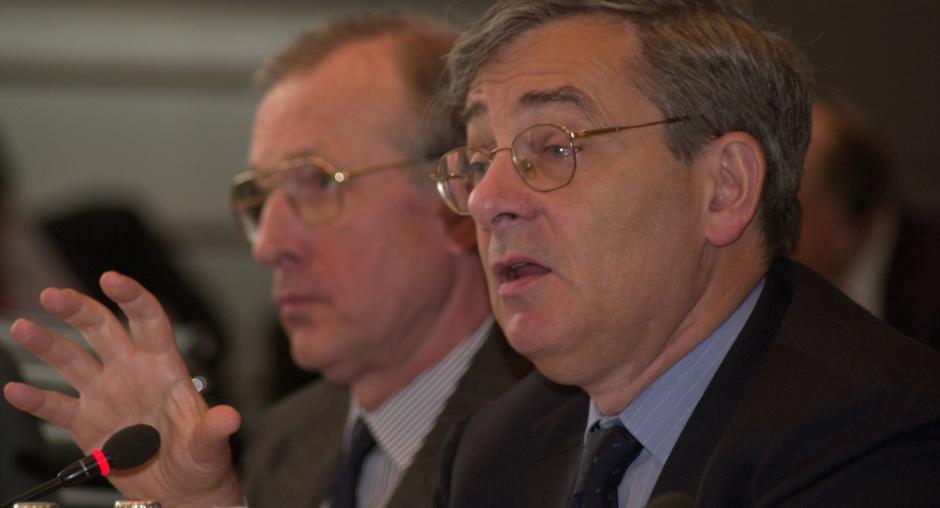Newsroom
EBRD President urges OSCE participating States to support small business
VIENNA 6 March 2003

(OSCE/Ayhan Evrensel)The President of the European Bank for Reconstruction and Development, Jean Lemierre, addresses the OSCE Permanent Council, Vienna, 6 March 2003. (OSCE/Ayhan Evrensel) Photo details
VIENNA, 6 March 2003 - The President of the European Bank for Reconstruction and Development (EBRD), Jean Lemierre, urged OSCE participating States on Thursday to support small business, improve energy efficiency and encourage regional trade to help stimulate economic growth.
In his first address to the Permanent Council of the 55-nation OSCE in Vienna, he said ensuring a stable and predictable political environment was also essential for attracting much-needed foreign investment.
"If investors understand a country's political leadership, they will come. Otherwise they will not," he told delegations from the 55 OSCE countries.
Mr Lemierre noted that the OSCE and the EBRD had similar origins and common goals. The EBRD, the largest single investor in the former communist world, promotes the transition from centrally-planned to market economies.
Reviewing progress across the 27 countries in which the bank operates - all of which are OSCE participating States - Mr Lemierre said the region as a whole was much more stable than just a few years ago and a sound process of reform was underway in most countries. But the transition process was not complete.
Governments needed to play their part by tackling poverty, fighting corruption, reforming public administration and ensuring full respect for the rule of law.
Small and medium-sized enterprises, which form the back-bone of wealthy economies, deserved the active support of governments. "There should be a lobby to protect them and make sure they are not harassed and are treated appropriately," Mr Lemierre said. "This is not an economic question, it is a political question."
Energy efficiency should also be given greater attention. "It leads to an improved environment and economy and increases a country's capacity to export," Mr Lemierre added.
The Chairman of the OSCE Permanent Council, Ambassador Justus de Visser of the Netherlands, said there was a strong link between economic growth and socio-political stability.
"In this respect, the OSCE and the EBRD complement one another and reinforce each other's efforts," Ambassador de Visser said. "The EBRD is a very important partner for the OSCE and we are keen to intensify our co-operation."
The OSCE follows a comprehensive approach to security which embraces the economic and environmental aspects as well as the politico-military and human rights dimensions.
In his first address to the Permanent Council of the 55-nation OSCE in Vienna, he said ensuring a stable and predictable political environment was also essential for attracting much-needed foreign investment.
"If investors understand a country's political leadership, they will come. Otherwise they will not," he told delegations from the 55 OSCE countries.
Mr Lemierre noted that the OSCE and the EBRD had similar origins and common goals. The EBRD, the largest single investor in the former communist world, promotes the transition from centrally-planned to market economies.
Reviewing progress across the 27 countries in which the bank operates - all of which are OSCE participating States - Mr Lemierre said the region as a whole was much more stable than just a few years ago and a sound process of reform was underway in most countries. But the transition process was not complete.
Governments needed to play their part by tackling poverty, fighting corruption, reforming public administration and ensuring full respect for the rule of law.
Small and medium-sized enterprises, which form the back-bone of wealthy economies, deserved the active support of governments. "There should be a lobby to protect them and make sure they are not harassed and are treated appropriately," Mr Lemierre said. "This is not an economic question, it is a political question."
Energy efficiency should also be given greater attention. "It leads to an improved environment and economy and increases a country's capacity to export," Mr Lemierre added.
The Chairman of the OSCE Permanent Council, Ambassador Justus de Visser of the Netherlands, said there was a strong link between economic growth and socio-political stability.
"In this respect, the OSCE and the EBRD complement one another and reinforce each other's efforts," Ambassador de Visser said. "The EBRD is a very important partner for the OSCE and we are keen to intensify our co-operation."
The OSCE follows a comprehensive approach to security which embraces the economic and environmental aspects as well as the politico-military and human rights dimensions.
